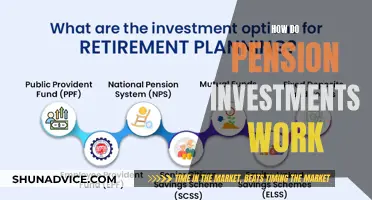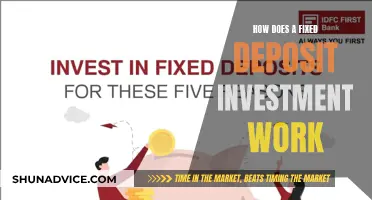
Buying a house can be a good investment, but it depends on your financial situation and the state of the housing market.
Advocates of buying property point to the opportunity to build equity, the potential for the property to appreciate in value over time, and the financial benefits of not paying rent. Detractors, however, highlight the high upfront costs of buying a home, the risk of depreciation, and the ongoing maintenance expenses.
| Characteristics | Values |
|---|---|
| Financial investment | Buying a house is a financial investment as it yields a profitable asset. |
| Appreciation | The value of a house can appreciate over time. |
| Equity | You can build equity by paying off your mortgage. |
| Tax benefits | There are tax benefits to owning a home. |
| Rental income | You can rent out your home to generate income. |
| Down payment | Buying a house requires a large cash outlay for a down payment. |
| Closing costs | Closing costs can be as high as 6% of the home's value. |
| Depreciation | A house can depreciate in value. |
| Maintenance costs | There are ongoing maintenance costs associated with owning a home. |
What You'll Learn

Appreciation and equity building
Appreciation
Appreciation refers to the increase in a home's value over time. While not guaranteed, homes generally appreciate, leading to a profitable return on investment when sold. The national average for home appreciation is 3% per year, but this varies across regions. For example, from November 2022 to November 2023, home prices in the New England region of the U.S. increased by about 9.8%, while those in the West South Central region rose by only 3.1%.
Several factors influence appreciation:
- Location: Homes in desirable areas with good schools, transportation, and amenities are more likely to appreciate.
- Supply and demand: In a seller's market, where demand exceeds supply, home prices tend to increase.
- Economic conditions: A thriving economy with low unemployment, controlled inflation, and high wage growth boosts the housing market.
- Property maintenance: Well-maintained homes in good condition are more likely to appreciate.
Equity Building
Equity building is another critical component of investing in a house. Home equity is the difference between the appraised value of your home and the amount owed on your mortgage. It represents the homeowner's interest in the property and can be a valuable asset. Equity is built over time as the mortgage balance is paid off and the property value increases.
There are several ways to build equity in a home:
- Down payment: A larger down payment results in more immediate equity.
- Mortgage payments: Consistently making payments reduces the loan balance and increases equity.
- Shorter loan terms: Opting for a shorter-term mortgage, such as a 15-year loan, can help build equity faster by reducing the interest paid over time.
- Home improvements: Renovations and desired features can increase the property's value and build equity.
Equity building is a long-term process, and homeowners can utilise their equity for various purposes, such as purchasing a new home, making improvements, or securing additional financing.
The Evolution of Investing: How Old Financial Tools are Shaping the Future of the Market
You may want to see also

The pros and cons of buying a home
There are several factors to consider when deciding whether to buy a home. While it can be a good investment, it also comes with a set of challenges and risks. Here are some pros and cons to help you make an informed decision:
Pros:
- Long-term investment and value appreciation: Homes typically appreciate in value over time, and real estate investing is generally less volatile than the stock market. According to data from the St. Louis Federal Reserve, the median home sales price in the US increased significantly from 2012 to 2022.
- Equity building: As you pay down your mortgage, you build home equity, which can be a source of emergency funding or investment for other financial goals.
- Tax benefits: The interest paid on a mortgage is usually tax-deductible, and homeowners can also deduct property tax payments from their taxes.
- Rental income: If local laws permit, you can rent out a portion of your home to generate additional income, which can help offset mortgage payments.
- Sense of ownership and belonging: Homeownership provides a sense of pride and establishes roots in the community.
Cons:
- High upfront costs: Buying a home requires a large cash outlay for a down payment and closing costs, which can range from 3% to 6% of the home's value.
- Depreciation risk: While rare, homes can depreciate in value, especially in undesirable locations or during economic downturns.
- Ongoing maintenance and costs: Homeownership comes with regular maintenance expenses, which can be costly and time-consuming. Additionally, other costs like property taxes, homeowners insurance, and HOA fees can add up.
- Limited flexibility: Buying a home is a long-term commitment, and it can be challenging to move to a new location quickly.
Ultimately, the decision to buy a home depends on your financial situation, goals, and personal preferences. It is essential to carefully weigh the pros and cons and consider seeking professional advice to make an informed choice.
AGNC Investment Dividends: Payout Patterns and Frequency
You may want to see also

The costs of buying a home
The upfront costs of buying a house are significant, and there are also ongoing expenses to consider. Here is a breakdown of the costs of buying a home.
One-time Costs
Down Payment
The down payment is usually the most significant upfront cost when buying a home. While it is possible to put down as little as 0% on some government-backed mortgages, the average down payment was 7% for first-time buyers in 2021. A larger down payment can help you secure a lower interest rate and avoid private mortgage insurance (PMI).
Closing Costs
Closing costs typically range from 2% to 6% of the home purchase price and include inspections, appraisals, lender fees, attorney fees, and other administrative costs.
Moving Costs
Moving costs depend on the distance and the amount of stuff being moved but can range from $900 to over $6,000 for local moves and up to $10,000 for long-distance moves.
Ongoing Costs
Mortgage Payments
The mortgage payment is likely to be the biggest ongoing expense for a homeowner. It includes the principal (the amount borrowed) and interest. The national median mortgage payment is $1,672, but this varies based on the home price and the cost of living in the area.
Property Taxes
Property taxes are paid to the local government for community amenities and services and vary by state and county. The national average property tax rate was 1.08% of the property value in 2020.
Homeowners Insurance
Homeowners insurance protects against losses and damage to the home and typically costs around $1,784 per year, although this varies by state and region.
HOA Fees
Homeowners Association (HOA) fees are paid by homeowners in planned developments or condos and cover the cost of maintaining shared common areas. The national average HOA fee was $331 per month in 2015, but fees can range from a few hundred dollars a year to thousands of dollars a month.
Utilities and Maintenance
As a homeowner, you will be responsible for 100% of the utility costs, which can be significantly higher than when renting. The average American homeowner spends about $270 a month on utilities and $311.69 on electricity, heating, and cooling. Maintenance and repair costs can add up to 1% to 4% of the home's value annually.
Other Considerations
When considering the costs of buying a home, it is also important to factor in the opportunity cost of investing a large amount of money in a single asset. Additionally, the time and effort required for maintenance and repairs should be considered, as they can be significant.
In conclusion, while buying a home can be a good investment, it is important to carefully consider and plan for the various upfront and ongoing costs involved.
Homes: The Ultimate Investment?
You may want to see also

The financial mindset of a homeowner
Homeownership is a significant financial milestone and a dream for many. However, it is essential to understand the financial mindset that comes with owning a home. Here are some key considerations and how they shape a homeowner's financial perspective:
Long-Term Investment Mindset
Homebuying is a long-term financial commitment. The value of a home typically appreciates over time, and homeowners need to adopt a patient investment mindset. This means understanding that the real estate market can fluctuate, but historically, home values tend to increase over the long term. This mindset helps homeowners weather short-term market shifts and focus on the bigger picture.
Financial Responsibility and Discipline
Becoming a homeowner often signifies a shift towards financial responsibility and discipline. The process of saving for a down payment, budgeting for closing costs, and qualifying for a mortgage instils financial discipline. Homeowners need to manage their finances effectively, ensuring they can cover monthly mortgage payments, taxes, insurance, and maintenance expenses. This disciplined approach to money management often spills over into other areas of their financial lives, such as saving, spending, and investing.
Equity Building and Wealth Creation
Cost-Benefit Analysis
Homeownership comes with various costs, from the upfront expenses of buying a home to the ongoing maintenance and repair costs. Homeowners need to adopt a cost-benefit mindset, weighing the financial implications of their decisions. For example, they may consider the return on investment of a renovation project or the long-term savings of switching to energy-efficient appliances. This mindset helps homeowners make informed choices and effectively allocate their financial resources.
Tax Benefits and Deductions
Homeownership also brings tax implications, and homeowners need to develop a mindset that considers the tax benefits and deductions available to them. For instance, they can deduct mortgage interest and property tax payments from their taxable income. Understanding these tax advantages can help homeowners maximise their financial gains and make more informed decisions about their overall tax strategies.
Emotional Detachment for Financial Gain
While a home may hold sentimental value, a homeowner needs to cultivate a mindset that allows them to make financially prudent decisions when necessary. This may involve recognising when it is time to sell their home to take advantage of a seller's market or being willing to relocate for financial reasons, such as downsizing to a smaller home to free up capital. Emotional detachment enables homeowners to make rational financial choices and avoid letting sentiment cloud their judgement.
In conclusion, the financial mindset of a homeowner is shaped by their understanding of the long-term nature of the investment, the need for financial discipline, the focus on equity building, the consideration of costs and benefits, the utilisation of tax advantages, and the ability to detach emotionally when necessary. Cultivating these mindsets helps homeowners make informed decisions and maximise the financial benefits of owning a property.
Microsoft: Invest Now or Miss Out?
You may want to see also

When buying a home is a bad idea
While buying a home is often referred to as the American Dream, it can be a bad idea if you buy before you are ready. Here are some reasons why buying a home may be a bad idea in certain circumstances.
Pressure from Other People
If you reach a certain age or start a family or get married, you may feel pressured to buy a home. However, it is important that you are emotionally and financially ready to buy a home and not just buying because you feel like it's what you are "supposed" to do.
You May Move Soon
If you know that your job will transfer you, or you plan to move due to school graduation or another life event, you may be better off renting a home than buying a new house each time you move. The rule of thumb is to buy a home if you plan on being in the area for at least five years.
You Have Large Amounts of Debt
If you are carrying large amounts of debt, you may not be ready to buy a home. Large amounts of debt can prevent you from paying your mortgage, which will severely damage your credit and financial health. Taking on more debt in the form of a mortgage may not be wise if you already have a lot of debt.
You Can't Afford Home Repairs and Maintenance
If buying a home is stretching your budget, you may not be able to cover home repairs and annual maintenance costs. If you travel a lot, it may be difficult to care for your home throughout the year, and paying someone to do it for you can be a large additional cost.
Acquisition Costs are High
Housing prices and mortgage interest rates are currently quite high, making the costs associated with becoming a homeowner especially steep. Housing prices have skyrocketed, and mortgage interest rates remain steep, which lowers your buying power and makes a home purchase today more expensive than it used to be.
Appreciation is Not a Sure Thing
While homes generally appreciate in value over time, it is not guaranteed. The value of homes in a given area depends on the overall economy of that area. For example, look at what happened in Detroit during the financial crisis of 2008, when many people experienced negative returns on their investment as they bought high and sold low.
GameStop Stock: Buy or Bye?
You may want to see also
Frequently asked questions
Buying a house can be a good investment if you are financially stable and looking for a place to live. However, it can be a risky choice if you are not financially prepared.
The pros of buying a house include the potential for long-term home and equity appreciation, saving money on rent, and greater financial stability.
The cons of buying a house include high closing costs, possible depreciation, and ongoing maintenance costs.
The value of your home can be affected by its location, the real estate market conditions, the size of the home, mortgage interest rates, and the health of the economy.







